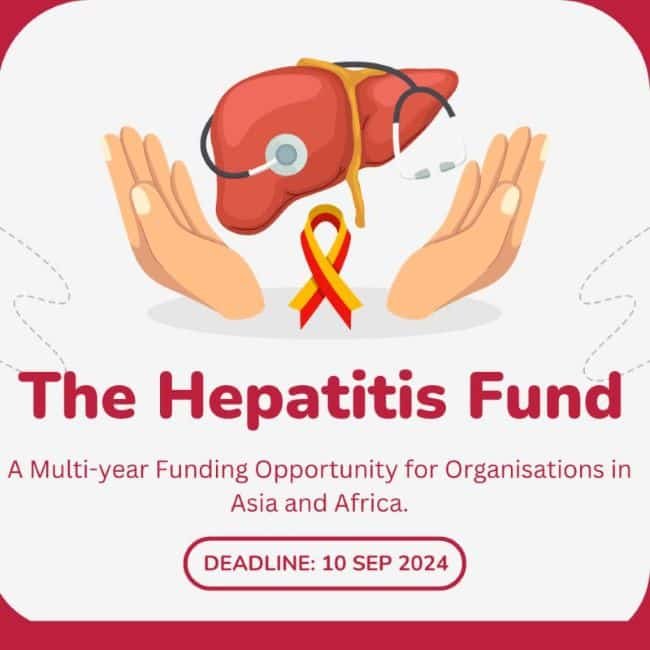The Hepatitis Fund is excited to announce a new opportunity for transformative initiatives aimed at advancing the elimination of hepatitis.
The Hepatitis Fund Scope
- Through this multi-year funding opportunity, organisations may apply for a grant to support their work aiming to eliminate viral hepatitis as a public health threat.
- Grants will be allocated to projects serving populations in low- and middle-income countries in Asia and Africa, for both hepatitis B and C.
- Proposals should demonstrate close coordination with national programmes and strong commitment and collaboration from national governments. Programme design should be country-led and informed by meaningful engagement with community and civil society organisations.
- Implementation should incorporate person-centred strategies. Targeted advocacy activities should also be included and be aimed at raising awareness, scale up, and building political support for programmes that are human rights-based and gender equitable.
- THF will prioritise projects that demonstrate ways to secure funding for scaling up and use innovative approaches. The proposed idea should integrate scientific/technological, sociocultural, and/or multi-sectoral innovation. AI and eHealth projects that significantly enhance healthcare efficiency and cost-effectiveness by streamlining processes and improving patient outcomes will be prioritised. THF will give special attention to technologies that optimise resource allocation, lower operational costs, and improve data management, ultimately leading to a more responsive and sustainable healthcare system.
- Projects funded by THF may include the procurement of commodities (e.g. medicines and diagnostic equipment) for the purposes of the project and within the agreed budget.
- THF encourages grantees to procure treatment commodities by using pricing ceilings agreed by THF, CHAI, Viatris, and Hetero or the lowest available prices in the country of implementation.
- THF allocates funds to its grantees through a competitive process for each call for proposals. Meeting all the specified requirements does not ensure that your proposal will be chosen.
The Hepatitis Fund will consider proposals for projects divided into two tracks:
- Track 1: Will focus on the advancement of planning and financing elimination activities, particularly through the provision of technical assistance to support national government leaders.
- Track 2: Will focus on the development or delivery of programme services by the implementing organisation.
Funding tracks
Track 1: Use of data and technology to inform planning and financing.
- Harnessing the power of data to engage senior leaders and make the data easy to understand for key stakeholders so that they are moved to confront the burden of hepatitis. For example, there are untapped databases which provide data, modelling tools, and decision analytics to support eliminating hepatitis B and C globally by 2030.
- Working with Ministry of Health and Ministry of Finance officials to develop strategic financing approaches. While most countries with a significant burden/prevalence of viral hepatitis have national action plans to address the disease, they are often limited in scope, ambition and implementation to reach elimination goals due to the perceived insurmountable costs.
- Example of activities include, but are not limited to:
- Costing a viral hepatitis elimination plan
- Making the investment case for hepatitis elimination
- Examining innovative financing mechanisms to meet those costs.
- Showcasing the outcomes of financing strategies to demonstrate to other countries what is possible.
- Establishing quality national data collection, surveillance, and modelling
- Building capacity for monitoring and evaluating the hepatitis programme indicators
- Providing technical expertise to key decision makers in governments to advance their top priorities to test and treat viral hepatitis.
Track 2: Developing programmes to deliver services
- Saving lives by promoting maternal, newborn, and child health.
- Vertical transmission (also known as mother-to-child-transmission, or MTCT) is the most common form of transmission of hepatitis B (HBV) in many high-prevalence areas such as East Asia and Africa and may occur in up to 90% of infants of mothers with chronic HBV, if specific ante- and perinatal interventions are not provided.
- Birthing facilities are an underutilised channel for delivering comprehensive services for the prevention of HBV infection in children, particularly HBV birth-dose vaccination. Integrating prevention of vertical transmission of HBV (PMTCT) into routine perinatal care promotes maternal, newborn and child health and strengthens health care delivery systems in general.
- Illustrative activities include, but are not limited to:
- Increasing facility-based delivery
- Expanding and rolling out timely birth dose vaccination
- Increase uptake, availability, and quality of HBV PMTCT services among pregnant women
- Assess and develop strategies to address HBV PMTCT service implementation.
- Accelerating access to testing and treatment approaches
- Implementing efficient and innovative approaches for accelerating the testing of populations for hepatitis to identify those persons who have chronic infection and link them to appropriate care.
- Illustrative activities include, but are not limited to:
- Decentralising hepatitis services and task shifting of hepatitis care.
- Raising awareness about the viral hepatitis challenge and solutions
- Supporting advocacy and technical assistance for increased financing at global and national level
- Integrating people centred hepatitis services delivery within universal health coverage
- Ensuring equitable access to essential medicines and technologies to address viral hepatitis by improving procurement systems
- Screening key populations and addressing stigma associated with viral hepatitis infections
- Integrating hepatitis care into other relevant health programmes
- Increase general health workforce competencies relating to viral hepatitis testing and treatment
- Developing and use of e-health tools, cost-effective and secure communication technologies as a key enabler in the delivery in the health care services.
- Increasing awareness and communicating patient education, e.g., by engaging civil society and patient support groups
- Sharing best practices and lessons learned to facilitate scaled-up roll-out across countries
- For both tracks, THF encourages and prioritise e-health initiatives that enhance and promote health data sharing and evidence-based and innovative approaches to facilitate access to testing and linking to care and treatment.
- For Track 2 on Service Delivery programmes, THF encourages all projects to include and integrate the local community, local government, and activities to raise awareness and demand.
- Advocacy efforts should be specifically tailored and integrated into service delivery programmes to increase awareness and garner political backing for programmes.
The Hepatitis Fund Details
- The number and size of the individual awards will vary depending upon the scope of the proposed projects and availability of funds. Applicants may submit a maximum of two different applications.
- For Track 1 project, The Hepatitis Fund anticipates awards will not exceed US$ 250,000 and will be limited to an 18-month grant period.
- For Track 2 projects, two maximum amounts will be allocated depending on the reach and number of countries where the project will be implemented.
- For multi country or regional projects (at least three countries), THF anticipated awards will not exceed US$ 1,000,000 per year and will be limited to a 36-month grant period.
- For single country or regional projects, The Hepatitis Fund anticipated awards will not exceed US$ 500,000 per year and will be limited to a 36-month grant period.
Eligibility Criteria for The Hepatitis Fund
The proposal is eligible for consideration if it complies with the following criteria:
- The primary purpose of the project is to advance the efforts to eliminate viral hepatitis
- The proposal addresses at least one the THF programmatic directions
- The proposed approach is innovative
- The proposal is sustainable and scalable
- The proposal targets low- and middle-income countries in Africa or Asia
- The organisation has the capacity to implement the project
- The project has a strong community engagement approach
Organisational eligibility criteria
In order to apply for a grant, organisations must meet the following eligibility criteria:
- Have demonstrated success and proven record in carrying out similar or related efforts
- Have strong working relationships with host governments and other partners and/or a clear plan for developing and maintaining such relationships
- Be in good financial standing
- Are able to fulfil required due diligence requirements
- Are able to launch project activities within 90 days of receiving project funds
- If a deficit exists in either of the two previous fiscal years, include a letter signed by the Chief Executive Officer/Director outlining the reason for the deficit and corrective action taken to overcome it.
Ineligible
- The following categories/purposes are not eligible for funding:
- Basic research and early development work
- Direct funding to government entities
- Grants for individuals and scholarships
- Sponsorship of events
- Seed funding for newly created organisations
- Funds intended to pay off existing debts/financial obligations
- Funds for retroactive purposes
- Grants for graduate research papers
- Funds to support lobbying activities
- Funds to support subgrantees for the implementation of the project
The following types of organizations are not eligible for funding:
- Entities without a bank account under its business registration
- Non-charitable organisations
- Government entities
- Entities under legal proceedings
- Entities that have declared bankruptcy
How To Apply for The Hepatitis Fund
Click Here to Apply
Application Deadline: 10th September 2024
Elevate Your Business With Our Expert Services!







